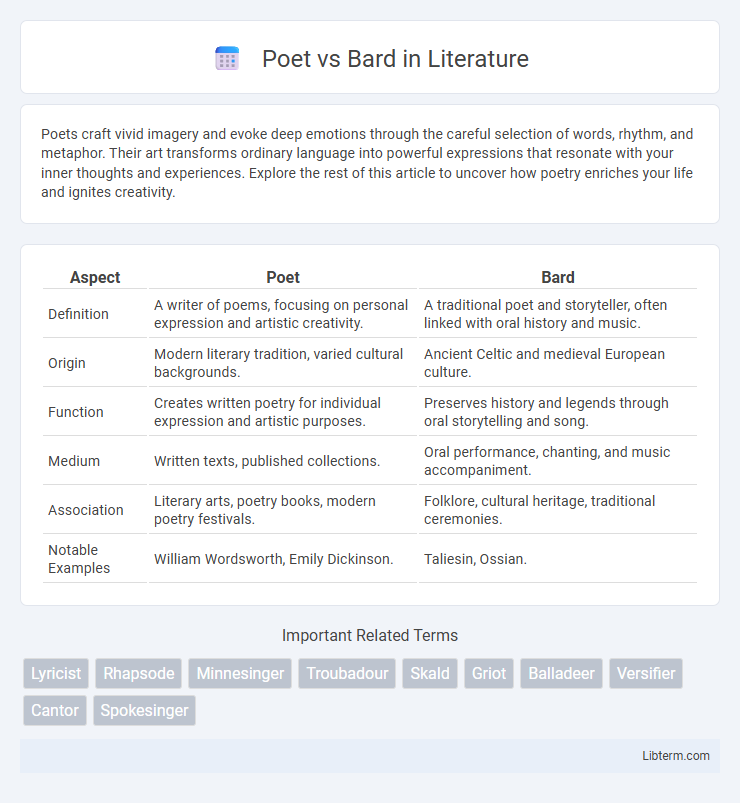Poets craft vivid imagery and evoke deep emotions through the careful selection of words, rhythm, and metaphor. Their art transforms ordinary language into powerful expressions that resonate with your inner thoughts and experiences. Explore the rest of this article to uncover how poetry enriches your life and ignites creativity.
Table of Comparison
| Aspect | Poet | Bard |
|---|---|---|
| Definition | A writer of poems, focusing on personal expression and artistic creativity. | A traditional poet and storyteller, often linked with oral history and music. |
| Origin | Modern literary tradition, varied cultural backgrounds. | Ancient Celtic and medieval European culture. |
| Function | Creates written poetry for individual expression and artistic purposes. | Preserves history and legends through oral storytelling and song. |
| Medium | Written texts, published collections. | Oral performance, chanting, and music accompaniment. |
| Association | Literary arts, poetry books, modern poetry festivals. | Folklore, cultural heritage, traditional ceremonies. |
| Notable Examples | William Wordsworth, Emily Dickinson. | Taliesin, Ossian. |
Defining Poet and Bard: Key Distinctions
A poet is a writer who uses structured verses, rhyme, and meter to express emotions, ideas, and stories through carefully crafted language. A bard traditionally refers to a poet who also performs their work, often accompanied by music, and serves as a cultural storyteller or historian. The key distinction lies in the bard's role as an oral entertainer and preserver of tradition, whereas a poet primarily focuses on the written or recited artistic creation.
Historical Origins and Evolution
The term "poet" originates from the Greek word "poietes," meaning a maker or creator, reflecting its roots in ancient literary traditions. "Bard" specifically refers to Celtic storytellers and musicians who preserved oral history through verse, with origins tracing back to early medieval times in Ireland and Wales. Over centuries, poets expanded beyond oral performance to written forms, while bards maintained a distinct cultural role in storytelling and ritual.
The Role of the Poet in Society
The poet plays a crucial role in society by capturing human emotions, experiences, and cultural values through creative language that resonates across generations. Unlike the bard, whose role traditionally centers on oral storytelling and preserving history through performance, the poet often crafts written works that challenge, inspire, and provoke reflection within communities. Poets contribute to cultural identity and social change by weaving narratives that reflect collective consciousness and individual insight.
The Bard’s Traditional Functions
The Bard traditionally serves as a cultural historian and storyteller, preserving oral traditions and genealogies through poetic performances. These performers often play musical instruments, such as the harp, to accompany their recitations, enhancing the emotional impact of their narratives. Unlike general poets, who focus on written or spoken word artistry, bards function as entertainers, chroniclers, and community educators within ancient Celtic societies.
Literary Styles: Poet vs Bard
Poets craft verses using structured forms such as sonnets, haikus, and free verse, emphasizing rhythm, rhyme, and vivid imagery to evoke emotions and provoke thought. Bards traditionally combine storytelling with music, employing oral techniques, mnemonic devices, and lyrical narratives to preserve cultural history and entertain audiences. The poet's literary style centers on written artistry and personal expression, while the bard's style prioritizes performative oral tradition and communal engagement.
Cultural Significance and Influence
Poets have historically shaped cultural narratives by expressing societal values and emotions through structured verse, often influencing literary traditions worldwide. Bards served as oral historians and entertainers in ancient cultures, preserving history, mythology, and cultural identity through song and storytelling. The bardic tradition deeply impacted the transmission of cultural heritage, especially in Celtic societies, where their role extended beyond poetry to the maintenance of community memory and identity.
Famous Poets and Renowned Bards
Famous poets like William Shakespeare and Emily Dickinson are celebrated for their profound impact on literature, shaping modern poetry with timeless themes and innovative styles. Renowned bards such as Homer and Taliesin hold a distinguished place in history for preserving oral traditions and epic storytelling that defined ancient cultures. The distinction lies in poets' written works versus bards' role as oral historians and entertainers, both contributing invaluable cultural and artistic legacies.
Oral Tradition vs Written Verse
Poets and bards both craft verse, but bards primarily excel in oral tradition, memorizing and performing stories aloud to preserve cultural narratives and history through generations. Poets typically focus on written verse, carefully constructing text to evoke emotion and meaning on the page, often intended for private or public reading. Oral tradition in bardic performance emphasizes communal experience and improvisation, while written poetry centers on permanence and refined literary techniques.
Modern Interpretations of Bards and Poets
Modern interpretations distinguish poets as versatile creators who use diverse forms and themes to explore human experience, while bards are often seen as cultural storytellers preserving oral traditions. Contemporary bards emphasize performance artistry and communal memory, frequently incorporating music and spoken word to engage audiences. Both roles overlap in celebrating linguistic creativity, yet bards retain a strong connection to heritage and historical narratives in today's artistic landscape.
Choosing Between Poet and Bard Today
Choosing between a poet and a bard today depends on the intended impact and medium of expression. Poets craft carefully structured verses to evoke deep emotions and explore complex themes, often suited for written or published works. Bards combine storytelling, music, and performance to engage audiences directly, making them ideal for live events and oral traditions.
Poet Infographic

 libterm.com
libterm.com